Who Should Decide What’s Secret?
While our leaders may not be fully trustworthy, they, not disgruntled low level employees, are best positioned to decide.
My latest for The National Interest, “Leaders and Leakers,” has posted. The argument is rather complex for excerpting but the gist is:
Should we fully trust Obama, Clapper, Secretary of Defense Chuck Hagel, CIA Director John Brennan and others in charge of deciding what secrets to keep from us? History tells us that we’d be fools to do so. Certainly, presidents, cabinet secretaries and intelligence officials have lied to us in the past.
At the same time, Obama has now twice been elected president. Clapper, Hagel, Brennan and others have been thoroughly vetted and approved by the Senate. They’ve spent years earning our trust and every action they take is under constant scrutiny.
Given a choice, I’d rather place my trust in those charged with safeguarding our nation’s secrets to do so honorably than to make every disgruntled Army private or low-level contractor a de facto national classification authority.
[…]
None of this is to say that the current system is perfect. In an ideal world, Congress would be more aggressive in pushing back against the excesses of the executive and the judicial branches, and the Foreign Intelligence Surveillance Court would be a less of a rubber stamp. There’s too little resistance to intrusive programs if they’re done in the name of public safety or fighting terrorists.
But the answer isn’t to put those at the bottom of the chain of command in charge of deciding what remains secret. Those at the top should do the jobs with which they’ve been entrusted.
That penultimate paragraph will be the subject of my next piece.


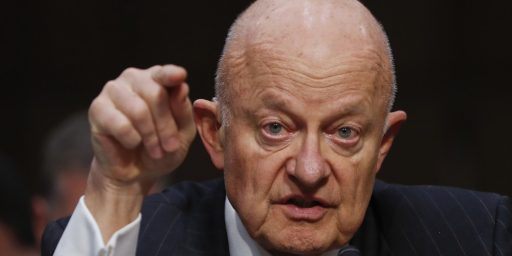
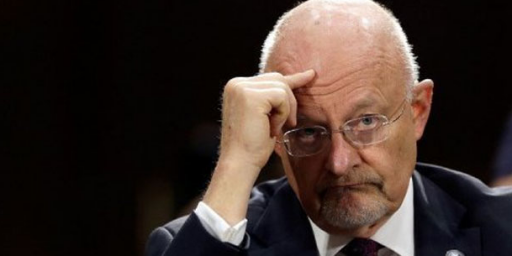
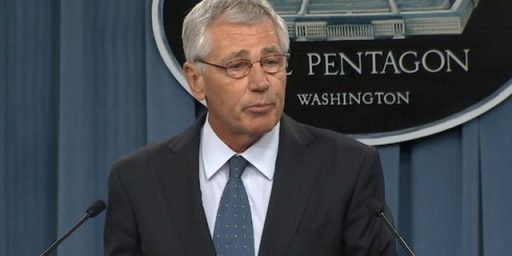
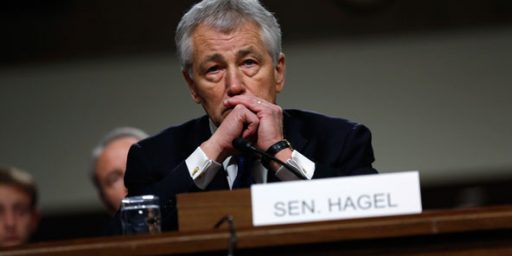
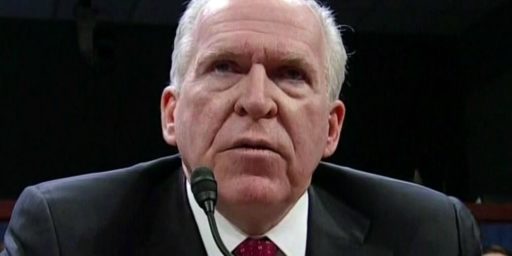
The problem is that that gives them a vested interest in keeping things secret, since it helps them get re-elected if they hide offensive practices from the public.
You also have cases like Wyden and Paul, who seemed to want to divulge info but couldn’t because of the existence of the secrecy laws in the first place. It becomes something akin to question begging.
Unfortunately, this borders on that same old naive idea that “we just need to get the “right” guy in office, and then everything will be fine.”
It has been proven, time and time again, that no matter who ends up in that office, he will turn around and use the power of the office to seize greater and greater control and power. Obama, who was considered a wild-eyed idealist when it came to civil liberties and transparency when he was elected, has turned into an even more secretive and heavy-handed president in those areas than GWB was. You would think by now that we would be more cynical about expecting the President and his administration to restrain themselves and their access to power and control. Governmental power seems to be a one-way ratchet.
@Joe Reed: @Ben: I’m not arguing that the executive should be trusted to restrain itself–although it does a better job than it’s given credit for. I’m arguing that Congress and the courts need to be more aggressive in pushing back. I’m going to write that piece shortly.
I keep hearing that if we have done nothing wrong then we have nothing to worry about with regard to our personal information.
As @Joe Reed: above suggests, why then are these government programs secret?
The lifers in Congress have too much to lose. Paul Ryan isn’t going to sacrifice his two-day-a-week work schedule and 6 figure salary to a handful of guys with box-cutters. John Boehenr isn’t going to give up his membership at the Burning Tree Club, a male-only, hyper-exclusive country club. And he is not going to give up his 100 round a year lifestyle. So absolutely anything goes.
And thus we end up with a looking glass world…where the individual mandate (which both parties have supported at one time or another) is the end of the free-world as we know it…but warrantless wire-tapping of the masses is just fine.
James: “At the same time, Obama has now twice been elected president. Clapper, Hagel, Brennan and others have been thoroughly vetted and approved by the Senate. They’ve spent years earning our trust and every action they take is under constant scrutiny.”
The last sentence contains two lies. They’ve spent years showing that they can’t be trusted, and many of the actions they take are never scrutinized.
James, the whole f-ing reason that the actions in question are receiving any scrutiny worth a rat’s fart is that somebody leaked.
@Barry:
+1 – I have a hard time restraining myself from pointing out the cognitive dissonance in anyone arguing that Snowdon was wrong, but now we definitely should have a debate about this programs and what their limits are. If Snowdon had done the “right” thing, the debate would never have happened. We would have just kept on going on without lives, completely ignorant of these surveillance programs.
To paraphrase a comment I read in another editorial, our society is based on the premise that the actions of public officials ought to be exposed to the scrutiny of the voting public, while the private lives of the citizens ought to be protected from government interference. Yet increasingly that foundation has been turned on it’s head by officials who increasingly have access to more and more of our lives while cloaking themselves in more and more secrecy so that we have no ability to judge their performance.
I think the optimum solution is for the government to monitor as little as possible and be as open as possible about what it’s monitoring. A less than optimal solution would be to monitor a lot but be very open about what’s being monitored. Much less optimal is to monitor a lot, be closed about it, and rely on the goodwill of the NSA, the FISA court, and the Congressional oversight committee.
Worst case is monitor everything, do so secretly, and avoid oversight. Based on the reports of the FISA court in essence rubber-stamping every request put in front of it and claims by members of the oversight committee that they’d been told that the NSA did not have information which they later learned that it, indeed, had, that seems to be about where we are.
James: “At the same time, Obama has now twice been elected president. Clapper, Hagel, Brennan and others have been thoroughly vetted and approved by the Senate. They’ve spent years earning our trust and every action they take is under constant scrutiny.”
(from http://thinkprogress.org/security/2010/06/07/100994/obama-nominates-clapper/)
“In Oct. 2003, DNI Nominee James Clapper Said It Was ‘Unquestionably’ True That Iraq Moved WMD To Syria”
James, any comment?
James, I’m looking forward to the follow-up on this editorial.
Security is a topic that is best thought of is a Hegelian Dialectical sense:
Unfortunately, we’ve also reached a point where it seems like any public friction on these issues has taken on a hyper-partisan characteristic. Which means that, whatever congressional debate on this issue is taking place, almost has to be driven underground in order to give the law makers space to have productive friction and hopefully reach synthesis.
@Dave Schuler:
From some of what I’ve read/heard, it doesn’t appear that FISA was simply “rubber-stamping” requests. I’m in the process of doing some research on this for a post, but the short story is, that while almost all FISA requests are approved, a far lower number of them (though still significant) are approved on first request.
Many are required to be revised. And while we don’t know the specifics of those revisions, many have to do with restricting the initial request.
I think Dave Schuler puts up a very good scale of risk.
For what it’s worth also, open-source intelligence (OSINT) plays a large role these days.
The presumption that our knowledge of the world comes from secrets may not be that accurate. When the CIA data-mines, it may get more out of Indonesian newspapers (and blogs) than Indonesian phone calls.
(Imagine the intelligence value of a bot that could read every blog post or tweet out of Pakistan.)
The anonymous leaks are a symptom that the system isn’t working as advertised.
The problem with anonymous leakers is that you are captive to the ideology and personality of the leaker. The latest leaker was somewhat naive in his ideology., but he wasn’t out for money or did not desire the downfall of the USA. I can assure you that the people lauding Mr. Snowden would be less happy had he simply delivered the contents of the laptop to China or Iran for money and we had found out about it that way.
Even sticking to Snowden, I note that no one here wants to defend Snowden’s thesis: that the system should not be improved, or be given greater oversight, but should be dismantled altogether.
Relying an anonymous leakers to be watchdogs is a bad idea.
@Matt Bernius:
As I wrote in the comments of another post, I think the real answer is that we don’t know. And, practically by definition, we’ll never know.
What concerns me is that we be left with a “you’ll just have to trust us” and that’s not nearly good enough.
http://chicksontheright.com/posts/item/24332-obama-has-strong-words-of-disagreement-with-obama
lol…The only one who vetted Obama in the main stream liberal media is Obama. He does it by lying, lying and then lying about lying. The others are proven clowns, goofs and hacks. Most are all three and that gets them promoted for failures or loyalty to ideology, usually both.
Who should keep secrets you ask….Well you asked
It should be us, the American citizens.
Obama has violated the 1st and 4th amendments like 300 million+ times X 24/7 X 5 years and Bush needs to answer too, if he was doing it. The debate should be when to hold the impeachment to get or rights back and how soon can we get C-span to cover it so it is transparent.
A couple of points,
@Tony W:
While I agree with the general point this statement makes, I have to wonder why it is that people are perfectly comfortable with a corporation like Google or Facebook having all this information but freak out the second the gov’t gets it. And saying a private corporation can’t harm you is BS. Firstly, 2 words: Deepwater Horizon. Secondly, they would sell your soul if it increased their profit margins.
@Sam Malone:
Again, they had a warrant. It may have been rubber-stamped by the FISA court, but that is a matter of the separation of powers.
@Ben:
I have a hard time restraining myself from pointing out the fact that we have had this debate, or to be more accurate our elected representatives did, twice: 2001 and again in 2011.
@Stormy Dragon:
Power corrupts. Your point is?
@Dave Schuler:
Let’s see…. The people directly responsible for the oversight of these programs now claim they had no idea…. Dave, that is called “Covering your ass.” Seeing as politicians are prone to
lyingplaying fast and loose with the truth, I would not put too much faith in such statements.The NSA has been with us for 60+ years and it is doing exactly what it was created for. Is this right and proper? I doubt it. But I am not surprised by it. Too bad so few were listening back in 2001 when it would have been so much easier to restrain this monster. Want to do something constructive about it now?
Join the ACLU.
@stonetools:
I did take a half-step in that direction, with the idea that “secret” intelligence might be less important than we think it is.
Someone on the radio said that our chance of being killed by a terrorist is 1 in 35 million.
Perhaps we are foolish to take those odds as a justification for a surveillance state. Either we don’t really need that surveillance, or we need to use it a lot more, to catch many more villains.
(Should the surveillance state be tracking deadbeat dads?)
What are the chances that we are being spied on right now? 100-110%?
@G.A.Phillips:
It depends on the definition of “spied” but 100% is a fair guess.
Maybe they should be tracking which group of liberal POS government union hacks is having a party or renting hookers with millions of our tax dollars?
@Dave Schuler:
Totally agree. The problem, as you articulate, is that much of the administrative information does not need the same level of security.
The fact that I’m having so much trouble trying to figure out how many FISA requests were kicked back for revision points to exactly that issue.
@G.A.Phillips:
In a surveillance state, why wouldn’t we?
Do do otherwise would be to leave those public servants open to blackmail and manipulation.
(It should also be noted that in a darker turn of the surveillance state the NSA starts to manipulate those public servants themselves.)
@OzarkHillbilly:
I meant debate on the specific things that are being done in these programs. That has never happened. Even some of the Reps and Senators seem to be surprised by the breadth of these programs. Doesn’t that tell you that it hasn’t really been debated?
And there was absolutely no debate on this in 2001. It was passed at lightning speed, and everyone opposed was called a traitor. I don’t recall how much actual debate we got in 2011. I know that every single amendment that was proposed to try to limit the scope of the reauthorization was shot down without any attempt at argument.
As it was explained on NPR, a lot of the surveillance “surprise” comes from extension of a known principle.
The Supreme Court has been following a precedent that we have a privacy expectation for exchanges between ourselves and a counter-party, but when we give information to “a third party” our expectation of privacy is gone.
Verizon metadata is a clear example of that. I call you on the phone. I “know” Verizon knows of my conversation. What I say to you is still private, but what Verizion knows is not.
Apparently the Supreme Court expects to revisit the “third party rule” at some point, but will we care? The polls say most people don’t, perhaps because they have some version of michael reynolds’ position. They know that 1 in 35 million is long odds, but they don’t particularly care about their metadata.
@john personna:
Yes, it does. Primarily it’s the same principle that applies when you mail a letter. Anyone along the way between your house and the destination address can see the To and From. There’s no reasonable expectation of privacy in the address information.
Further, you don’t own your metadata–the service provider does. The only say you have in what’s done with it is contained in the “privacy agreement” (that you never read) between you and the service provider.
But there’s still a valid call for control of how that information is used–we can certainly establish a warrant requirement for the reconstruction of your entire life from the metadata. It could be said that beyond a certain point, the insight into a person’s life through their metadata is so great that it amounts to a warrant-required search.
@stonetools:
This is the part that bothers me the most about all of this. Who knows what other information which he didn’t release (or hadn’t gotten around to releasing YET anyway …) was in his possession?
I’m supposed to believe that some ideologue convinced of his own righteousness and in possession of a TS/SCI clearance only took the few documents we’ve seen along with him? Spare me. I’m not that naive.
And neither are the rest of you.
And he took this information to Communist fricking CHINA? WTF was he thinking?
Is there a soul in the room prepared to even try to advance the argument that whatever he took with him hasn’t already been read and copied at length by the Chinese? Of course they’ll hand him over, but they’ll certainly get all of his goodies before they do. Now, if you’re still prepared to defend your “hero” in the face of that likelihood, God help you …
The guy is an idiot.
So very tired of hearing how low the odds are of being killed by a terrorist. You know what else has really low odds? Getting bubonic plague. Is that because plague no longer has an interest in killing us? No, it’s because we took appropriate countermeasures.
Here’s a statistic to bear in mind: there are people in this world who want your odds of dying of terrorism to be 100%. They’re working on that outcome.
So, no, we shouldn’t panic and start rounding up Muslims and blowing up random countries (any more) but we should continue to take reasonable steps to keep those odds so relaxingly low.
@michael reynolds:
“Bubonic” plague is overly specific. Odds of dying by infectious disease is much higher, hence a dollar spent at the CDC has higher ROI.
I’ll make this argument for less secrecy: this whole freak-out over metadata comes because of the surprise reveal. The bare facts would have been far less exciting had we learned about it in normal news reports out of open briefings.
On other threads I keep annoying people by asking them to connect PRISM to some real world harm — either something that has occurred or something that must flow inevitably from PRISM, or at least something that connects the dots of the assumed slippery slope without going all dystopian fiction.
The best I’ve heard so far is that it might result in some innocent person ending up on the no-fly list.
Now, ending up on the no-fly would be annoying for someone, even more annoying if it were me. But there is a yawning chasm between, “Could screw up air travel for a few people,” and “I must steal NSA data, publish it and run off to China!”
As it is the country seems to be shrugging, which in my opinion is either evidence of maturity or proof that too many people think action movies are real. But there would be even more shruggery occurring if we had known about this program all along.
@john personna:
I think you’re missing one very important fact: I was just reading a description of plague in London, and therefore plague was on my mind.
You’d know that if you were the NSA.
(More generally, most human planning involves an intuition of statistical outcome. We put our money in funds that we think will do well. We go to parties that we think will be fun. In ancient times we hunted on the trail where we thought there would be deer.
Humans are quasi-good at statistics.
Our self-knowledge that we are only that good should lead us to improvement, and where possible, mathematics, rather than a punt and a declaration that quasi-good is best.)
@michael reynolds:
What would Richard Nixon do with PRISM?
Are you really sure that America has no more Nixons in its future?
@john personna:
Just an aside, but FISA was passed in RESPONSE to Nixon’s overreaching. It constrains the federal government in ways that it was never constrained under Nixon.
I’ve been thinking of an analogy for those upset that government might see data that various communication companies and/or industrious individuals have or could largely find for themselves.
It goes like this: A person puts on a completely see through plastic coat, wearing nothing underneath. They he walks around the city wearing it. Everyone walking around can see his naked body through the coat, and many are taking photos and video of him with their phones. A couple of days later, the plastic coat-wearing individual discovers that his image was picked up by speed camera’s at the city’s intersections, and he is arrested for public indecency. He then cries bloody murder that the government is spying on him by capturing video of him in his revealing attire. The speed cameras were set up to catch people speeding in cars, of course, but they catch a lot of other things as well, and can be used as evidence in a criminal prosecution.
In case you’re not following, the public street is the Internet and cellular radio waves, and by posting things to Facebook, sending email, texts, and for that matter making mobile phone calls, you are walking around town in a see through outfit. It’s absurd to believe that everyone on the street can see you but the government cannot. If you want your privacy to remain so, you need to wear an opaque coat and/or stay off the public street.
@HarvardLaw92:
Right. I’d say we had two trends. On the one hand we had more anti-spying laws put in place. Second, we developed a stronger cultural opposition to dirty politics.
The question is whether acceptance of PRISM as a status quo will enable future dirty tricks.
Is this a pendulum deal, and are we leaving the good zone?
@mantis:
I don’t think that is a good analogy. It relies too much on someone “putting on a transparent raincoat.”
We haven’t done that. We’ve followed age-old patterns of behavior, with new tools. Rather than use a corner phone booth, we use a cell phone. Rather than writing a letter to the editor, we post a comment. It’s all the same.
The difference is that all the little “public” things we did were never logged into an international database. No one could search every submitted letter to the editor. Maybe your friend recognized your car at an intersection, but no one logged your time and location information for later retrieval.
(The only people who came close to this level of data logging were the surveillance states of Eastern Europe, and even they could not search their tons of paper reports with any efficiency.)
@john personna:
I’ll agree, with the caveat that it dovetails very well with a comment that mantis made on another thread, namely that the problem is an astounding degree of naivety about technology.
People willingly participate in activities that destroy, in a very fundamental sense, whatever small degree of privacy they might have reasonably been expected to retain with regard to public statements and/or actions, then complain after the fact that they didn’t end up with the degree of privacy that they thought they had.
In that regard, I think that his analogy was quite apt. The problem is that people have privacy expectations which harken to a world which no longer exists, and hasn’t existed from the moment that the made the decision to go online or to avail themselves of technology.
It has benefits, and it has a price.
@john personna:
Then it’s not all the same. It’s different, because we are now using technology that makes it so. People need to adjust to the new technological reality.
@john personna:
I think we have no choice but to accept it as a status quo. It is not going away–even if the program named “PRISM” is somehow dismantled, it will simply rise again under a different name.
The prevention of dirty tricks must happen when the rules are defined, because nobody’s putting the (dead) horse (I’m beating with this metaphor) back in the barn.
Clapper may have “spent years earning our trust” but he also violated that trust when he lied to the Senate. Ron Wyden asked Clapper in a hearing “Does the NSA collect any type of data at all on millions or hundreds of millions of Americans?” and Clapper replied, “No sir … not wittingly.”
That’s a straight up lie. Clapper knew the answer was “yes”, he knew Wyden was going to ask the question, and yet he lied under oath, directly to Clapper’s face and to the American people watching. Clapper, obviously, cannot be trusted to tell the truth, even when under Congressional scrutiny by an elected representative of the American people, and it’s therefore laughable to consider him as trustworthy.
@Rafer Janders:
Clapper would have been committing a felony by even acknowledging to unauthorized personnel that these programs existed, much less discussing what they do. Wyden, frankly, was skirting the edge of committing one as well by inquiring about programs that he knew to be classified (if he indeed did know) in a public hearing. The only thing that would have saved him would be Section 6.
You are not entitled to know the content of classified information.
Would anyone’s reaction to the Wyden/Clapper exchange change if you knew he’d been asked this question previously in closed session and answered in the affirmative?
@Stormy Dragon:
Someone else recently wrote that we should know almost everything they do because they’re public servants, while they should know almost nothing about us because we’re private citizens. Instead this situtation is now reversed: they watch everything we do and say while we know very little about their activities as they hide behind a wall of secrecy.
@HarvardLaw92:
That’s the problem, isn’t it? These programs supposedly rely on Congressional oversight, and yet the people running the programs are allowed to lie under oath to the Congress supposedly overseeing them.
If it’s a felony to even acknowledge the fact that the government spies on American citizens without cause, then we’ve gone far beyond the bounds of any rule of law and constitutional restraint — it is, in fact, a lawless system, where the spies can do whatever they want to do, secure in the knowledge that no one can challenge or question them because even to do so is against the law (or what remains of it).
@HarvardLaw92:
Then he could have said “No comment” or “Senator, I am prevented by federal law from discussing these programs” or “I can neither confirm nor deny that” blah blah blah.
But he didn’t. He said “no.” Even if I concede he wasn’t allowed to say “yes”, nothing obligated him to lie. Actively lying is a far step beyond what he was obligated to do.
@Rafer Janders:
And moreover, we can say “Clapper is trustworthy” or we can say “Clapper’s job allows — or even requires — him to lie to the American people.” But we can’t say both. We cant’ say “trust Clapper, he won’t do anything wrong” and “you really can’t trust a word coming out of Clapper’s mouth, and if he lies, there’s no censure for him.”
@Rafer Janders:
Congress set the system up to limit the potential for leaks. I honestly don’t have a problem with it.
Senate: 15 senators from both parties as well as the majority leader, the minority leader, and the ranking members from both parties sitting on the Armed Services Committee. That’s 19 out of 50.
House: 21 representatives, the Speaker and the House Minority leader.
In both cases, the leadership, in both houses and on both sides of the aisle, is in the loop and can take action as appropriate with respect to excesses.
So no, honestly, I don’t have a problem with it. It balances the need for oversight and involvement of the leadership with the need to keep information as contained as prudently possible. If we’ve learned anything over the years, it’s the truism that the more people who know something, the more likely it is to leak.
If anything at all disturbs me about the current setup, it’s that fruitloop Michelle Bachmann is one of the committee members.
@Rafer Janders: I’d say that we have to go with
“Clapper’s job allows — or even requires — him to lie to the American people.”
and again, I’m fine with that. Personally, I want somebody in that job who takes it seriously enough to protect classified information from ANYbody not cleared to receive it. If that includes lying, then so be it.
We’re always going to have tension between the public wanting to know every little thing that the government does and the government (especially the intelligence services) having a legitimate need to keep information contained in order to preserve the integrity and efficacy of the programs it involves.
We live in a world essentially without borders now, thanks to instant communication. That brings with it a heightened need to protect (and to limit) the circulation of information. What somebody in the US knows, everybody in the world knows, and pretty much in real time. If the price of preventing people on the outside of the borders from knowing is that people on the inside can’t know either, then that’s just the price we have to pay.
@Rafer Janders:
I don’t see how he could have said, “No comment.”
Senator: Is it the case, Mr. Clapper, that we have broken the Japanese military codes and can read all of Tojo’s messages?
Clapper: No comment.
No comment in response to a direct question means, “Yes.” The question should very likely not have been asked in a public space. There is no realistic alternative to outsourcing oversight to people required to keep secrets. The alternative is that we can have no secrets.
Honey, does this make me look fat?
No comment.
See? Not so easy to not comment without giving something away.
@michael reynolds:
Yeah, I reject the premise that the question “is the US government spying on the American people” should not be asked where the American people can hear it.
If the American government is spying on the American people, that shouldn’t be a secret. Not in a democracy, anyway.
1. Snowden is a loser. If that (I will not even call him “who”) is what the NSA and Booz Allen (i.e., the intelligence-industrial complex) are trusting with our classified information,why should we trust the NSA?
2. If it’s that easy for someon to get this kind of information out into the public domain and this guy does end up in China, the NSA is one big joke.
3. An oath is an oath. There are lawyers in the IC and in Congress to handle the issue of what to ask the head of an intelligence service in public. Otherwise, Clapper committed perjury.
@Stormy Dragon: “Yet increasingly that foundation has been turned on it’s head by officials who increasingly have access to more and more of our lives while cloaking themselves in more and more secrecy so that we have no ability to judge their performance. ”
Ten thousand times this!
@OzarkHillbilly: “And saying a private corporation can’t harm you is BS. Firstly, 2 words: Deepwater Horizon. Secondly, they would sell your soul if it increased their profit margins.”
Because the government can f*ck you far faster and harder than a corporation can.
@john personna: “(It should also be noted that in a darker turn of the surveillance state the NSA starts to manipulate those public servants themselves.) ”
Two comments – first, as I understand it, the FISA court judges have to have security clearances, which can be denied for [REDACTED – CLASSIFIED] reasons whatsoever. This means that the system has largely, if not entirely, captured the court.
Second, there’s a story about J Edgar Hoover, than he’d invite newly elected/appointed Reps, Senators, judges and officials in for a chat. During that chat, he’d let them have an idea of how much sh*t he had on them, their spouses, friends, family and associates.
I think it would be wise to contain the overall freaking out about data collection until we know how accurate Mr. Snowden has been with his allegations. Thus far, his track record is not good (shocking). The Washington Post had to walk back much of their story, he inflated his salary considerably, he’s made claims of having authority to conduct wiretaps that don’t add up, his allegations of how much data is being gathered don’t add up, and Google and the other firms are itching to disclose as much as they can to prove his claims are exaggerated.
In short, he is not turning out to be a very credible witness to his own cause.
lol ya right Harry, if Bush was in office doing this you would pulling your hair out in fits of rage filled madness while babbling racist.
@Jen:
I don’t believe Washington Post walked back much of anything. Narrow denials of questions not quite on topic are not the same thing.
@john personna: This is some interesting speculation from the UK Telegraph.
This, in particular:
Didn’t Greenwald tweet the other day that he’d been working with Snowden since late February? Wouldn’t that be about when Snowden started with BAH?
Snowden went to the Washington Post first, demanded they publish immediately, and when they said no he went to Greenwald:
There’s a lot more to this than “hero whistleblower exposes government malfeasance” and we’ve yet to find out.